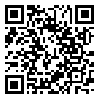BibTeX | RIS | EndNote | Medlars | ProCite | Reference Manager | RefWorks
Send citation to:
URL: http://ijn.iums.ac.ir/article-1-1534-en.html
2- Associate professor, Nursing and Midwifery Care Research Center, School of Nursing and Midwifery, Tehran University of Medical Sciences, Tehran, Iran (Corresponding author). Tel: +98-21-66927171 ,
Background & aim: Self-efficacy regulates stressful processes. Furthermore, students are known as a high risk group for depression suffering . This study aimed to investigate the relationship between depression and self- efficacy in nursing students of Tehran University of Medical Sciences.
Material & Methods: This is a correlational study. The study population consisted of undergraduate nursing students of Tehran University of Medical Sciences. For sampling, some classes were randomly selected. Totally, 249 nursing students from semesters 1-6 completed the questionnaires. Data gathering tool consisted of three sections: Demographic information, Sherer’s et al. general self-efficacy questionnaire and Beck’s depression inventory. SPSS-PC (v. 16) and statistical tests such as Pearson correlation, Chi-square and Fisher’s exact test were applied for data analysis.
Results: Pearson correlation test showed statistically significant reverse correlation between students’ depression and their self-efficacy scores (p<0.001 r=-0.461). Furthermore, there were significant reverse relationship between depression and interest to field (p<0.001). There were also significant direct relationship between self -efficacy and adequacy of family income (p=0.029).
Conclusion: The findings showed a reverse relationship between nursing students’ depression and their self- efficacy. It means that higher levels of depression is correlated with lower levels of self -efficacy. Further research to investigate the relationship between self- efficacy and depression in other faculties and in comparison with other fields is recommended.
Received: 15 Jun 2013
Accepted: 11 Sep 2013
Received: 2013/09/16 | Accepted: 2013/09/16 | Published: 2013/09/16
| Rights and permissions | |
 |
This work is licensed under a Creative Commons Attribution-NonCommercial 4.0 International License. |




